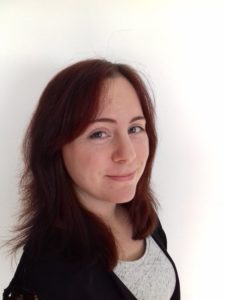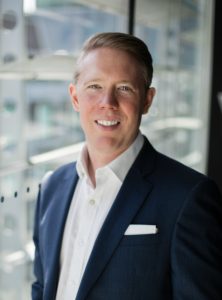Krisztina: You have been a Toastmaster for 10 years. Why did you want to join the community?
Richard: I was reading all the different sales books when I was younger. This thing called Toastmasters kept popping up as an important skill. But in Britain, the Toastmaster is somebody in a red coat at a wedding that announces the bride and the groom, and I said to myself ‘I don’t think I need that skill’. But when I went to a meeting, I realised that this was a place to grow as a leader and as a communicator. This was paramount, as these are the two most important skills for me in my life. I signed up that day and never looked back.
Krisztina: You enrolled in the previous Toastmaster learning programme. What level did you achieve?
Richard: I completed Advanced Leadership Bronze and I will shortly achieve Advanced Communicator Gold.

Krisztina: You competed in the district finals for humorous speaking, table topics and evaluation. How did it feel to win the heart of the audience?
Richard: I had an amazing year in 2018, where I entered three out of the four competitions and went all the way to the district finals in them all. For humorous speaking and table topics, I didn’t place. When you don’t place, you learn. It taught me a valuable lesson about speaking. I had spent my time leading up the speech contest rehearsing, so much so, that I wasn’t even in the room for most of the day before my speech. I wanted it to be ‘perfect’. When it was my turn, I did everything that I intended, got all the laughs I anticipated and got great audience interaction. But then I didn’t place, and I realised that whilst it may have been a perfect performance, giving a speech is not about staging a perfect performance. Public speaking is about creating a one-time moment, where you truly connect with your audience, through their hearts into their heads in a way that can never be repeated again. Much like the saying, ‘you can never step in the same river twice’, you can never deliver the same speech twice. Most importantly, I learned that your audience is your speech. It’s not about broadcasting, it’s about real, authentic and vulnerable connection with your audience. Hence it’s not so much about getting the message out. It’s about how do you get your message in. Into the hearts of your audience.
Krisztina: How does it come about that some people just perform, but then others can connect with the audience on an emotional level?
Richard: People can win contests for many different reasons. Sometimes it feels serendipitous, sometimes unpredictable. We don’t always get the winner that we think is right. So instead of winning, a speaker can focus on bringing authentic humour into a speech and being aware of their audience and what else they have heard, seen and learnt that day. The audience will respond to that and will know subliminally that they are hearing something new, that’s just for them. They’re not just hearing somebody reciting lines, a speech where the speaker is looking through or past the audience so that he can focus on the script in his head. If you’re going to get up and read a script, frankly, you might want to save you and your audience some time and just send an email.
Krisztina: You seem to be very interested in AI, can you please tell me know how that connects with Toastmasters?
Richard: Artificial Intelligence is adding new layers of understanding to our world, there’s some machine learning neural networks that can do some incredibly powerful things that we don’t fully understand. One area connected with public speaking is augmented reality. We have a challenge when we prepare to give a speech; practicing in front of a mirror, or to your friends. It is not going to be the same as stepping up in front of many strangers, with the adrenaline, the stress and the excitement, and all those eyes on us. The actual experience is going to feel very different from practising. One thing I’m working on is an app where you can put your VR headset on, and have an instant audience.
You’ll have settings, ranging from rapt attention and them hanging on your every word to completely distracted where they’re barely looking at you. Add artificial intelligence to that and you can start to get more interactivity, where the audience will respond to a joke, or display certain emotions in line with your content.
The other side of it on AI is where it is monitoring the audience. Many people are very confident, articulate and know their subject matter. Good for them. They’re great broadcasters, but that doesn’t mean they’re great at getting an emotional connection with their audience. Now, if we could start to see the micro behavioural signals of our audience, we could be more specific, both about what we are saying and how we are saying it. AI can analyse facial expressions, or it can be tracking attention, boredom, restlessness, or any number of different micro signals. And you, the speaker, can get this feedback in real-time, possibly via haptic, visual or audio cues, allowing you to change your speech based on the impact it is (or isn’t) making.
Krisztina: Toastmasters promotes leadership and communication skills, but what else have you achieved over your 10 year-journey?
Richard: I learnt a great deal when I stepped up to be the Vice President of Education (VPE) in my club. Suddenly people were saying ‘yes I’ll do that speech or take that role’ and then the last minute they wouldn’t be able to do it. The VPE role taught me to operate with quiet humility and to remember, that jobs and family and life will always come first for my members. Being VPE was about being the champion of the members, as in championing them to success. I learned to be calm and graceful in my communications. We just don’t know anybody’s journey. We don’t know what their hopes or their dreams are really, or their pains or their challenges. We don’t know what they’ve been through that day before the meeting. So let’s just be gentle. Let’s be encouraging. And let’s be kind. Toastmasters taught me that.

Krisztina: What do you plan to do as President this year in your club?
Richard: Our club, Eldergate Toastmasters in Milton Keynes, England is in a good shape and I’ve got a great team around me. With this in mind, I’m able to step back now from the club a little bit and say, ‘what do we want to get even better at?’ And ‘what kind of club do we want to be?’. I have asked my Vice President of Membership to write a mission statement and a value statement for us. And I want to challenge the members to deliver more value through their speeches: I’ve introduced new feedback forms, an idea from my amazing VPE and one of the questions on the form is ‘what did you learn from the speech?’ Now every speaker knows that they are going to get 30 evaluation slips looking to answer that question, so they may want to add a ‘message’ or call to action in their speech.
We are hosting self-development events at our club to which we invite the other clubs in the area, local businesses and the community. And I’m bringing in external speakers to present at our club so that we can learn from them, too.
Krisztina: What did you find the most challenging during those 10 years?
Richard: Moving from a small stage and friendly faces in the club, to the large audiences at the district level. I found it very difficult to develop my speaking to work on a larger stage. For all our members I coach them on making sure that their confidence comes from being prepared and knowing the purpose of their speech, not from the fact that there are friendly faces in the audience.
Krisztina: You have written a book about how to deliver an evaluation. What inspired you to write that book?
Richard: I felt our newer members were very reluctant to evaluate. For me, without question, the most valuable thing in Toastmasters is the evaluations. I think we learn a lot more from practicing evaluations than from giving prepared speeches. I asked Bill Brown DTM to help me create a short book for people to read ahead of their first evaluation. Then one thing led to another, and in the end I spent about two years creating a full 100 page book on every aspect of evaluation, including contests, by compiling everything I had learnt, and from interviewing some of the best evaluators in the district. I have been humbled by the kind and encouraging feedback I have received from those that have read the book. It was definitely a labour of love.
Krisztina: What would you tell someone, a person who is not a Toastmaster member yet but is interested in it?
Richard: Many people will join Toastmasters because they are suddenly aware of a conscious incompetence, that is they did a speech and it didn’t go as well as they would have liked. But ideally, you are looking for people with a passion and a purpose to join your club. The best speakers are made, not born, and in fact some of the best speakers in the world are introverts, who are not naturally confident. They care more about the audience than about the sound of their own voice.
You can encourage someone to join by connecting Toastmasters to their journey. Everybody has something they want to do better, and if you can help them understand how Toastmasters will help them meet that goal, which undoubtedly it will, then they will join.
Krisztina: How did you feel yourself during our meeting? What did you experience among us?
Richard: I’ve enjoyed the meeting today a lot. I’ve been to a few Toastmaster clubs around the world and today was an especially warm welcome. The atmosphere here is beautiful and the people are inspirational. I can see so much talent in this club. I’d love to have the opportunity to visit again.
